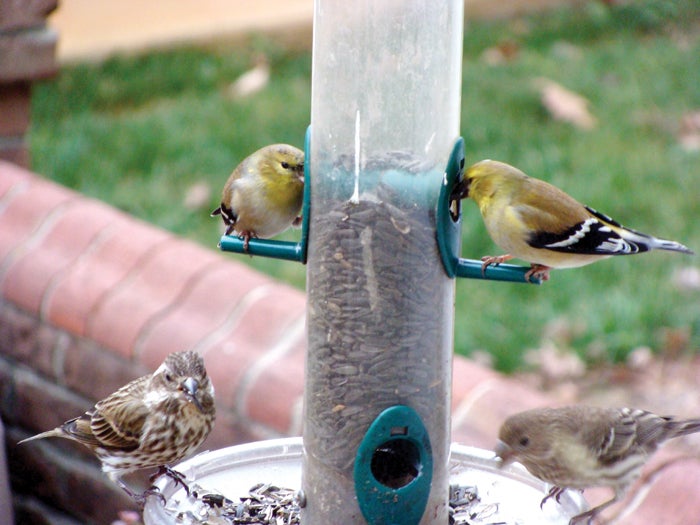Darrell Blackwelder column: Feeding our feathered friends
Published 12:00 am Sunday, January 24, 2021

- Finches enjoy seeds from a feeder.
We’re stuck inside with nothing to do but read and watch TV these days. Many have a fascination with birds and like to watch them during the winter months. So, you may wonder, what types of seed do birds like to eat?
Sunflower seeds — Black sunflower seeds or black oil seeds are preferred by finches. Cardinals prefer the gray striped seed, however very few birds will not eat sunflower seed.
Thistle — Thistle, also called niger or nyger, is a tiny black seed. Processing and import costs from Nigeria make this seed more expensive than other seeds but the advantage is that squirrels do not like it. Goldfinches prefer it along with chickadees, crows, doves, juncos, siskins, and sparrows.
Millet — Millet is the least expensive and can be scattered on the ground on low-platform feeders for doves, juncos, robins, sparrows, titmice and woodpeckers. Think twice before inviting woodpeckers onto your property.
Safflower — Safflower is often used as a substitute for black oil sunflower as it discourages grackles, starlings, and sparrows. This seed is best offered in hanging tubular feeders and hopper feeders and also sprinkled on the ground or tray feeders. Chickadees, titmice, nuthatches, goldfinches, house finches, grosbeaks, and jays like safflower. Cardinals are particularly fond of this seed, though it is expensive.
Peanuts — Use peanut pieces in any kind of tube or platform feeder. Whole shelled peanuts are a potential choking hazard to young birds and shelled peanuts are difficult for them to eat. Peanuts are favored by greenfinches, titmice, finches, nuthatches, siskins and woodpeckers.
Water — The best way to attract a wide variety of birds is to provide an assortment of food at a number of different feeders. However, water is one of the most important factors of attracting birds and other wildlife.
Darrell Blackwelder is the retired horticulture agent and director with the North Carolina Cooperative Extension Service in Rowan County. Contact him at deblackw@ncsu.edu .




